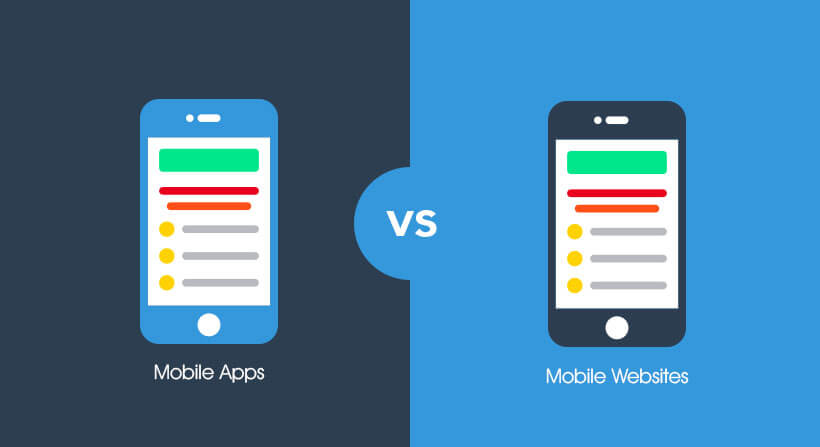
In the present world that we live in, humans have come a long way in terms of their behavior and interaction with the web platforms. At first, we collectively denied using online means for activities like shopping, at a later stage with some evolution, a large part of the population understood its advantages. Likewise, initially, while the masses most liked seeing things on big screens, there is now a huge shift that has noticed human tendencies including to instead getting things done quicker on their handheld devices- mobile phones.
Having said that, the fact that a lot of us still would want to perform certain activities only on our laptops or desktops as against our cellphones is still undeniable. Now, through this transition and with all the confusion, it is clear that users prefer doing most things on their mobiles instead of laptops or desktops more. But, a big question that most organizations still find themselves stuck at is: should one invest in building a quality mobile website or should the fund be rather allocated to a mobile app?
Mobile websites v/s mobile apps have been a huge dilemma for quite some time now. In our blog post today, we will try to decode this very confusion to get you better clarity on the matter.
Mobile Apps vs. Mobile Websites: What is the difference between the two?

- Mobile Website: A mobile website is essentially the replica of a desktop website, just optimized and scaled which makes it compatible for mobile viewing. The typical differences and features of a mobile website, when compared to a desktop website, are lesser white space, lesser page elements, and lesser fonts and logos.
- Mobile App: A mobile app, on the other hand, is a whole other ball game. Briefly, a mobile app, generally referred to as an ‘app,’ is a program that is also accessed by the user via the internet, but it's very programming is different from a mobile website. They are dedicated applications that make the user experience quicker, with a neater layout, and is more interactive, and more intuitive.
Mobile Apps vs. Mobile Websites: What do users prefer?
As per researchers and by the analysis of the numbers, it has been already determined, as you would have guessed, users spend as much as 90% of their time on mobile apps instead of surfing the internet through browsers. This is purely because of the fact that apps provide an unparalleled user experience in terms of speed, features, and functionality.
Especially when it comes to millennial usage, you would hardly ever find a millennial or a Gen Z kid that likes to surf mobile websites instead of downloading the apps. This is also particularly true in terms of e-commerce or retail mobile apps. Parents and population from the earlier days of the ’70s and ’80s, on the other hand, are responsible for major revenues for Facebook and similar platforms because they spend so much time on it!
Mobile apps are also more preferred because of the kind of engagement that they offer the users. Mobile sites definitely are responsible for driving user attention and awareness but once the users are already aware, they would immediately visit the stores to download the app against spending any more time on the websites.
Mobile Website vs. Mobile App: Conversions and Retentions

As per a research done by Criteo, just to add more emphasis and credibility to the already established and obvious facts, “mobile apps push more people down the purchase funnel, with 3x higher conversion rates compared to mobile sites and even 1.5 times more conversions per session than via desktop.”
One of the primary reasons for this is that mobile websites do not save any user data. Your mobile might have that feature to ‘remember’ your credentials, but the mobile websites, at large don’t. Hence, at the time of check out, most carts are abandoned as users get annoyed when instigated to fill up all credentials. On the other hand, mobile apps solve this problem as they almost always by default save your credentials when inputted once, saving you that effort each time at checkout.
Mobile Website vs. Mobile App: The Key Pros and Features Of Both
Mobile Websites :-

- A mobile website offers instant accessibility and does not need to be visited a store and then downloaded from there.
- Mobile Websites are more uniform and compatible across devices, hence, a single website can reach larger populations.
- A mobile website is much more flexible in terms of when an update needs to be made. Changes are also immediately visible as against apps that have to be pushed to users and require the user end also to update it by visiting the store.
- Mobile Websites can be discovered much more easily like the pages of the website can be displayed in search engine results.
Mobile apps :-

- Mobile apps can engage with the user via harmless push notifications.
- Mobile apps can retain user data that facilitates one-click checkouts and lower loading times.
- Since users see the app icons on their screen over and over, albeit subconsciously, it increases brand awareness.
- Mobile apps need not necessarily need an internet connection since the app developers can have it store the data locally, and later have it uploaded once the connection is established.
Final Words :-
Having established all facts, the key takeaway here is that when you need to decide between building a mobile website v/s a mobile app, the ultimate choice or the solution should be your end goals. Apps make more sense if you are a person looking to create an interactive platform for the consumer, like a shopping store or a gaming space. On the other hand, if your goal is to create content that can be shareable, that should appear on search engines and should be spread to a wide base of audience, like perhaps, a travel blog or an awareness generating platform, a mobile website would be more applicable
We also recommend consulting SEO companies to further help you establish the strongest modes and which platform amongst the two can benefit your brand by analyzing and tracking all leads from the backend. Digital marketing companies, such as us, have the potential and understanding of both platforms - although virtual - what works best and what helps rank the business.
Having said that, even if you are now planning to develop both, the app as well as the website, you should know that an app will make no sense if you do not have a mobile website in place. This is so because it is the mobile website that eventually drives traffic and awareness around an app.












%20in%20SEO.webp)

